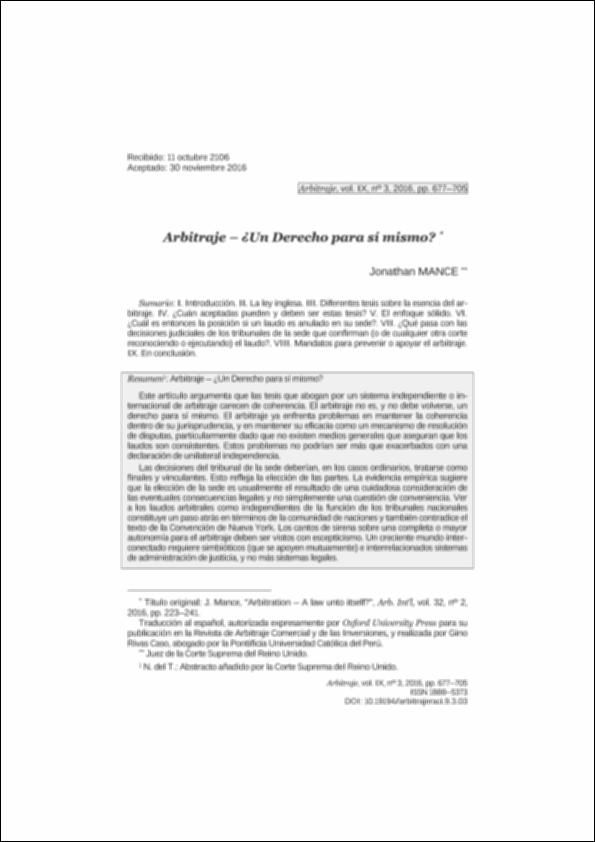Please use this identifier to cite or link to this item:
http://hdl.handle.net/10637/12615¿Un derecho para sí mismo?.
| Title: | ¿Un derecho para sí mismo?. |
| Authors : | Mance, Jonathan |
| Keywords: | Arbitraje.; Derecho internacional.; Ordenamientos jurídicos domésticos.; Ejecución de laudos internacionales.; Arbitration.; International law.; Domestic legal systems.; Enforcement of international awards. |
| Abstract: | Este artículo argumenta que las tesis que abogan por un sistema independiente o internacional
de arbitraje carecen de coherencia. El arbitraje no es, y no debe volverse, un
derecho para sí mismo. El arbitraje ya enfrenta problemas en mantener la coherencia
dentro de su jurisprudencia, y en mantener su eficacia como un mecanismo de resolución
de disputas, particularmente dado que no existen medios generales que aseguran que los
laudos son consistentes. Estos problemas no podrían ser más que exacerbados con una
declaración de unilateral independencia.
Las decisiones del tribunal de la sede deberían, en los casos ordinarios, tratarse como
finales y vinculantes. Esto refleja la elección de las partes. La evidencia empírica sugiere
que la elección de la sede es usualmente el resultado de una cuidadosa consideración de
las eventuales consecuencias legales y no simplemente una cuestión de conveniencia. Ver
a los laudos arbitrales como independientes de la función de los tribunales nacionales
constituye un paso atrás en términos de la comunidad de naciones y también contradice el
texto de la Convención de Nueva York. Los cantos de sirena sobre una completa o mayor
autonomía para el arbitraje deben ser vistos con escepticismo. Un creciente mundo interconectado
requiere simbióticos (que se apoyen mutuamente) e interrelacionados sistemas
de administración de justicia, y no más sistemas legales. This article argues that theses advocating an independent or transnational system of arbitration lack coherence. Arbitration is not, and should not become, a law unto itself. Arbitration already faces problems in maintaining coherence in its jurisprudence and confidence in its efficacy as a dispute–resolution mechanism, particularly given that no general means exist to ensure that awards are consistent. These problems could only be exacerbated by a declaration of unilateral independence. Decisions of the court of the seat should in the ordinary case be treated as final and binding. This reflects the choice of the parties. Empirical evidence suggests that the choice of seat is usually the result of a careful consideration of the legal consequences and not merely a matter of convenience. To view arbitral awards as autonomous of national courts is a step back in terms of the comity of nations and also contradicts the wording of the New York Convention. Siren calls for complete or yet further autonomy for arbitration should be viewed with scepticism. An increasingly inter–connected world needs mutually supportive and inter–related systems for the administration of law, not more legal systems. |
| Description: | En: Arbitraje: revista de arbitraje comercial y de inversiones. eISSN. 2603-9281. vol. 9, n. 3, 2016, pp 677?705 |
| URI: | http://hdl.handle.net/10637/12615 |
| Rights : | http://creativecommons.org/licenses/by-nc-nd/4.0/deed.es |
| Issue Date: | 30-Nov-2016 |
| Appears in Collections: | 2016 Arbitraje nº 3 |
Items in DSpace are protected by copyright, with all rights reserved, unless otherwise indicated.


